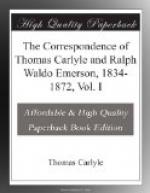May I not call it temporary? for when I ascend into the pure region of truth (or under my undermost garment, as Epictetus and Teufelsdrockh would say), I see that to abide inviolate, although all men fall away from it; yea, though the whole generation of Adam should be healed as a sore off the face of the creation. So, my friend, live Socrates and Milton, those starch Puritans, for evermore! Strange is it to me that you should not sympathize (yet so you said) with Socrates, so ironical, so true, and who “tramped in the mire with wooden shoes whenever they would force him into the clouds.” I seem to see him offering the hand to you across the ages which some time you will grasp.
I am glad you like Sampson Reed, and that he has inspired some curiosity respecting his Church. Swedenborgianism, if you should be fortunate in your first meetings, has many points of attraction for you: for instance, this article, “The poetry of the Old Church is the reality of the New,” which is to be literally understood, for they esteem, in common with all the Trismegisti, the Natural World as strictly the symbol or exponent of the Spiritual, and part for part; the animals to be the incarnations of certain affections; and scarce a popular expression esteemed figurative, but they affirm to be the simplest statement of fact. Then is their whole theory of social relations—both in and out of the body—most philosophical, and, though at variance with the popular theology, self-evident. It is only when they come to their descriptive theism, if I may say so, and then to their drollest heaven, and to some autocratic not moral decrees of God, that the mythus loses me. In general, too, they receive the fable instead of the moral of their Aesop. They are to me, however, deeply interesting, as a sect which I think must contribute more than all other sects to the new faith which must arise out of all.
You express a desire to know something of myself. Account me “a drop in the ocean seeking another drop,” or God-ward, striving to keep so true a sphericity as to receive the due ray from every point of the concave heaven. Since my return home, I have been left very much at leisure. It were long to tell all my speculations on my profession and my doings thereon; but, possessing my liberty, I am determined to keep it, at the risk of uselessness (which risk God can very well abide), until such duties offer themselves as I can with integrity discharge. One thing I believe,—that Utterance is place enough: and should I attain through any inward revelation to a more clear perception of my assigned task, I shall embrace it with joy and praise. I shall not esteem it a low place, for instance, if I could strengthen your hands by true expressions of the hope and pleasure which your writings communicate to me and to some of my countrymen. Yet the best poem of the Poet is his own mind, and more even than in any of the works I rejoice in the promise of the workman. Now I am only reading and musing, and when I have any news to tell of myself, you shall hear them.




